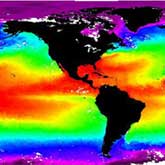What Are The Differences Between Global Warming, Greenhouse Effect, Greenhouse Warming, And Climate Change?
 The term Global Warming refers to the observation that the atmosphere near the Earth's surface is warming, without any implications for the cause or magnitude. This warming is one of many kinds of climate change that the Earth has gone through in the past and will continue to go through in the future. Temperature increases will have significant impacts on human activities: where we can live, what food we can grow and how or where we can grow food, and where organisms we consider pests can thrive. To be prepared for the effects of these potential impacts we need to know how much the Earth is warming, for how long the Earth has been warming, and the cause of the warming. Answers to these questions provide us with a better basis for making decisions related to issues such as water resource management and agricultural planning.
The term Global Warming refers to the observation that the atmosphere near the Earth's surface is warming, without any implications for the cause or magnitude. This warming is one of many kinds of climate change that the Earth has gone through in the past and will continue to go through in the future. Temperature increases will have significant impacts on human activities: where we can live, what food we can grow and how or where we can grow food, and where organisms we consider pests can thrive. To be prepared for the effects of these potential impacts we need to know how much the Earth is warming, for how long the Earth has been warming, and the cause of the warming. Answers to these questions provide us with a better basis for making decisions related to issues such as water resource management and agricultural planning.
The Greenhouse Effect is a term that describes how water vapor, carbon dioxide, and other gases in the atmosphere help maintain the temperature at the Earth's surface. The atmosphere approximates the function of a greenhouse by first letting sunlight (solar or short wave radiation) pass through to warm the Earth, while absorbing much of the heat (thermal or long wave radiation) radiated up from the surface of the Earth. Life on Earth would be very different without the Greenhouse Effect. The Greenhouse Effect serves to keep the long term annual average temperature of the Earth approximately 32 degrees C higher than the Earth's temperature would be without the Greenhouse Effect. Scientific evidence has shown that the Earth should warm as concentrations of greenhouse gases in the atmosphere increase above natural levels, much like what happens when the windows of a greenhouse are closed on a warm, sunny day. This additional warming is commonly referred to as Greenhouse Warming.
Greenhouse Warming is global warming due to increases in atmospheric greenhouse gases (e.g., carbon dioxide, methane, chlorofluorocarbons, etc.), whereas Global Warming refers only to the observation that the Earth is warming, without any indication of what might be causing the warming. Global Warming is accepted as fact by most of the scientific community. However, Greenhouse Warming is more controversial because it implies that we know what is causing the Earth to warm. Although it is known for certain that atmospheric concentrations of these greenhouse gases are rising dramatically due to human activity, it is less well known exactly how increases in these greenhouse gases factor in the observed changes of the Earth's climate and global temperatures. The majority of scientific evidence supports the theory that human activity is a major factor in currently observed global warming, but some of the warming may also be due to natural causes.
About the Author
NOAA National Oceanic and Atmospheric Administration
 The National Oceanic and Atmospheric Administration is an American scientific agency within the United States Department of Commerce that focuses on the conditions of the oceans, major waterways, and the atmosphere.
The National Oceanic and Atmospheric Administration is an American scientific agency within the United States Department of Commerce that focuses on the conditions of the oceans, major waterways, and the atmosphere.


